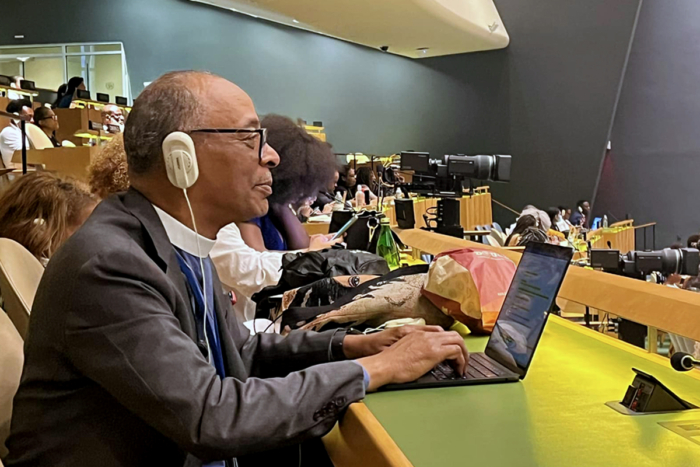Episcopal delegate attends meeting of new UN Permanent Forum on People of African DescentPosted Jun 6, 2023 |
|

Missioner for African Descent Ministries the Rev. Ronald Byrd listens to a debate taking place in the United Nations General Assembly Hall during the U.N. Permanent Forum on People of African Descent. Photo: Lynnaia Main
[Episcopal News Service] Representatives from The Episcopal Church took part in only the second session of the United Nation’s Permanent Forum on People of African Descent, with four days of debate, discussion and meetings at the United Nations headquarters in New York City.
The Rev. Ronald C. Byrd Sr., missioner for African Descent Ministries, was the church’s delegate to the May 30-June 2 forum, and he was accompanied by Lynnaia Main, the church’s representative to the U.N. They were joined at the opening plenary by the Rev. Margaret Rose, deputy for ecumenical and interreligious relations.
As a first-time delegate, Byrd told Episcopal News Service his goal was “to look, listen, learn” and to understand the process of how the large event functioned. He was among 900 representatives from what the U.N. calls “civil society” – nongovernmental organizations and others, including The Episcopal Church – as well as representatives of the 193 U.N. member states and other U.N. agencies. The United States delegation to the forum was led by Ambassador Linda Thomas-Greenfield.
The forum, which functions under the Office of the United Nations High Commissioner for Human Rights, was created by U.N. resolution on Aug. 2, 2021, with a variety of mandates, including to advise the Human Rights Council and others about issues of racism, racial discrimination, xenophobia and related intolerance, and to consider issuing a declaration on the protection of the human rights of people of African descent. The first session of the forum took place Dec. 5-8, 2022, in Geneva, Switzerland.
Byrd said that serving as a delegate was a wonderful experience that allowed him to “engage and network with those from around the world who are responsible for the work I do for The Episcopal Church.” Among the things he had suspected but had confirmed during the forum is that people of African descent around the world experience many issues familiar to Black Americans. “There are George Floyds in many countries,” he said, referring to the Black man who was killed by police in Minneapolis, Minnesota, on May 25, 2020, sparking a summer of marches and protests across the United States and in other countries about police brutality and racial discrimination.
The forum, Main said, was organized around five “thematic dialogues” that guided the agenda of the plenary sessions – five of them, each lasting about three hours – as well as side events offered by member states:
- Global reparatory justice,
- Transnational migration,
- Recognizing and addressing systemic and structural racism: a data-driven and evidence-based approach,
- Pan-Africanism for dignity, justice and peace, and
- Health, well-being and intergenerational trauma.
Byrd said reparations was a major issue in discussions, noting that The Episcopal Church already is engaged in similar conversations, especially with Presiding Bishop Michael Curry’s emphasis on Becoming Beloved Community and its work in social justice and racial reconciliation. “Reparatory justice is not just financial,” Byrd said. “Reparations is about atonement, transformation and restoration,” noting that those are biblical concepts.
There is no quick fix for tough issues like these, he said, but he’s glad that those at the forum were “leaning into these conversations” and that The Episcopal Church has a seat at the table for them.
Main said there were a few hiccups in the forums’ second meeting, including issues with registration that kept other Episcopalians from participating.
Hearing so many stories, some of which pulled at his heartstrings, Byrd said, took a lot of mental and emotional effort, but they all would inform and impact the work he undertakes with constituents of his office.
He added, “Sitting in the General Assembly, with a seat at the table, representing The Episcopal Church, will be one of the highest honors and privileges I’ve had as missioner for African Descent Ministries.”
–Melodie Woerman is a freelance writer and former director of communications for the Diocese of Kansas.

Social Menu